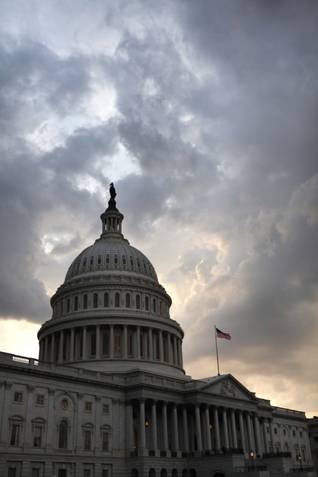
AP Photo/Jacquelyn Martin
This Monday, Aug. 1, 2011 picture shows the U.S. Capitol just after the House voted to pass debt legislation on Capitol Hill in Washington. Credit rating agency Standard & Poor’s says it has downgraded the United States’ credit rating for the first time in the history of the ratings.
Published Friday, Aug. 5, 2011 | 5:42 p.m.
Updated Friday, Aug. 5, 2011 | 7:37 p.m.
The country may have avoided default this week, but the way we did it brought about the next worst thing.
Friday night, international credit rating agency Standard & Poor’s downgraded the U.S. credit rating for the first time in the country’s history, from AAA to AA+.
“The downgrade reflects our opinion that the fiscal consolidation plan that Congress and the Administration recently agreed to falls short of what, in our view, would be necessary to stabilize the government’s medium-term debt,” S&P said in a statement announcing the change.
“More broadly, the downgrade reflects our view that the effectiveness, stability, and predictability of American policymaking and political institutions have weakened at a time of ongoing fiscal and economic challenges,” the statement said.
While S&P refrained from assigning blame to either political party, a cursory reading suggested strongly that where they found the most fault with U.S. fiscal policy was that it did not incorporate additional revenue — something Democrats had been pushing for but Republicans categorically refused to accept.
“Republicans and Democrats have only been able to agree to relatively modest savings on discretionary spending while delegating to the Select Committee decisions on more comprehensive measures,” the S&P statement said. “It appears that for now, new revenues have dropped down on the menu of policy options. In addition, the plan envisions only minor policy changes on Medicare and little change in other entitlements, the containment of which we and most other independent observers regard as key to long-term fiscal sustainability.”
In other words, what they wanted to see was the president’s “grand bargain,” or at least something that looked a lot like it.
Both the president and the Gang of Six had been angling to conclude $4 trillion deals with Republican leaders in the last few weeks before hopes of grand compromise fell apart and cuts-with-revenue bargains gave way to balanced budget amendment-driven bills out of the House.
The S&P appears to be objecting to the fact that the debate was even allowed to take place. “The statutory debt ceiling and the threat of default have become political bargaining chips in the debate over fiscal policy,” S&P’s statement read.
That sounds a lot like an endorsement of the Democrats’ original appeal that raising the debt limit should be done cleanly and separately from discussions about how to bring down the deficit.
Republicans who predicted a downgrade, like Nevada’s Dean Heller, had been arguing the exact opposite. Heller voted against the compromise to raise the debt limit because he said it didn’t do enough to reduce spending without any raises in taxes. He distinguishes taxes from revenues, though, saying he is in favor of removing tax loopholes as long as the country brings down the overall tax rate.
"Congress should have seized the moment to pass a debt reduction plan that not only placed our nation on a path towards fiscal sustainability, but also set the foundation for economic growth," he said in a statement late Friday night. "Our nation needs a plan that changes the way our government spends taxpayer dollars, reforms the tax code, and allows businesses to thrive."
Democrats, meanwhile, are using the S&P’s downgrade as license to say what they’ve been itching to say since Republicans first became intransigent on including revenues as part of the debt ceiling deal: We told you so.
“The action by S&P reaffirms the need for a balanced approach to deficit reduction that combines spending cuts with revenue-raising measures like closing taxpayer-funded giveaways to billionaires, oil companies and corporate jet owners,” Senate Majority Leader Harry Reid said in a statement Friday night.
“This makes the work of the joint committee all the more important, and shows why leaders should appoint members who will approach the committee’s work with an open mind — instead of hardliners who have already ruled out the balanced approach that the markets and rating agencies like S&P are demanding,” Reid said.
But it’s not yet clear exactly what the fallout will be. S&P is one of three credit rating agencies, and the other two, Moody’s and Fitch, already declared that they would not downgrade the nation’s AAA rating.
A downgrade in credit normally leads to a hike in national interest rates — but if that downgrade didn’t happen across the board, it isn’t clear how much it might affect the U.S. Treasury’s reaction.
A change in the national interest rate would trickle down through various other sectors of the economy, reaching consumers in everything from home mortgages to car loans to credit cards.
Credit ratings aren’t idle suggestions though: each of these industries represents certain parts of the market. So, depending on how investments are indexed, various municipalities could feel a significant hit.
We’ll do our best to suss out how this downgrade could hit communities across Nevada as more information is released.


Join the Discussion:
Check this out for a full explanation of our conversion to the LiveFyre commenting system and instructions on how to sign up for an account.
Full comments policy